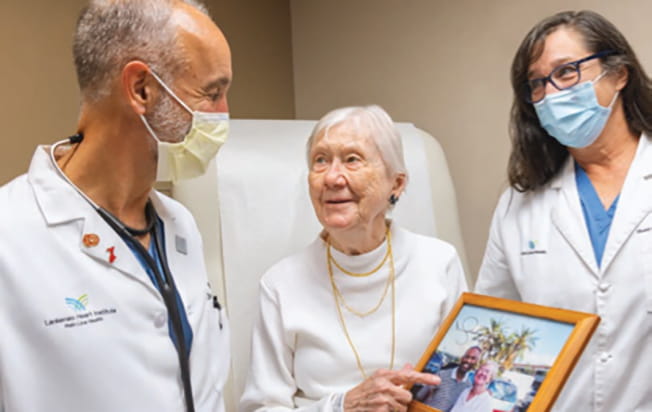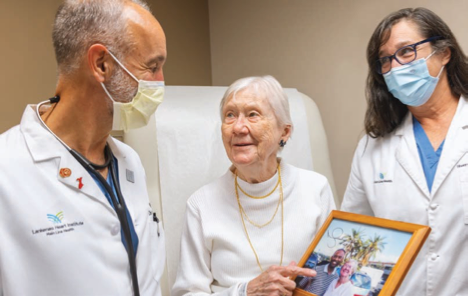Back in life’s flow: Trials provide increased options to treat heart valve disease

Betty Jeanne Turgeon was a rarity when she received a bachelor's degree in nursing seven decades ago and went on to a long, rewarding bedside career. So Turgeon, a Harrisburg resident, fully grasped the grimness of her prognosis in the summer of 2019 when she was diagnosed with heart failure from a failing and leaky tricuspid valve—a condition known as functional tricuspid regurgitation. Because of it, she could barely shower or get dressed without severe exhaustion.

When her daughter took her to see a cardiologist at a major Philadelphia academic medical center, he had no treatment option to offer her. But he had heard of a clinical trial that might provide one last chance. The trial was being conducted by William Gray, MD, chief of cardiovascular services at Main Line Health, co-director of Lankenau Heart Institute and a professor at Lankenau Institute for Medical Research (LIMR), also part of Main Line Health.
“I was very, very sick,” Turgeon says. “I knew my options were limited and I had to take the chance.” Turgeon proved to be a candidate, and in November 2019, Dr. Gray performed a minimally invasive procedure that made her among the first to undergo tricuspid valve reconstruction with the Cardioband system. She improved quickly, regained her energy, and soon was able to resume daily activities.
“I was feeling well and in February 2020 drove to Tampa, Florida, for the New York Yankees spring training,” says Turgeon, who will turn 93 this Christmas. “I m a diehard Yankees fan. My beau, Joe, and I go down for a month. And I do the driving, because I have a bigger and nicer car.”
Valvular heart disease: Crucial to catch early
The causes of valvular heart disease range from age-related degeneration to congenital defects present from birth.
“Valve disease, if gone untreated, may not be reversible,” says Basel Ramlawi, MD, chief of cardiothoracic surgery at Main Line Health, co-director of Lankenau Heart Institute and a LIMR professor. “Damage to the heart muscle may follow, which can lead to heart failure and sudden cardiac arrest. But if it's caught early, valvular repair can often return patients to their expected lifespan without symptoms.”
The purpose of the heart valves is to maintain a one-way flow of blood and prevent it from leaking backward or regurgitating. If a valve fails, the heart begins to work harder than it should, and one may experience shortness of breath and fatigue, and fluid can accumulate in the lungs, liver, legs and feet.
A portfolio of cutting-edge clinical trials
“Lankenau Heart Institute and LIMR physician researchers work together to offer one of the largest portfolios of innovative and minimally invasive valve repair options,” Dr. Ramlawi says. “Many of our investigators are national and international leaders in the field of minimally invasive valve repair.”
Among them is Dr. Gray, one of the nation's foremost experts in interventional cardiology. He has served as principal investigator for more than 50 clinical trials, including a mitral valve repair device called the MitraClip™.
In recent years, Dr. Gray brought the Food and Drug Administration s Early Feasibility Studies (EFS) program to Lankenau Heart Institute, making it one of a handful of sites in the nation to conduct first-in-human clinical research. Dr. Gray is the lead investigator of three EFS trials, including the Cardioband trial.
“After much development and testing, clinical trials are the final common pathway for how medical and surgical devices get approved by the FDA,” Dr. Gray says. “Patients are participating in the earliest experience with the device, the vast majority of which are ultimately approved as safe and effective and made available to the larger population of patients in need. So by participating in a clinical trial, patients get earliest possible access to these cutting-edge devices.”
A widening array of valve-repair options
Lankenau Heart Institute is focused on expanding the use of minimally invasive approaches such as transcatheter valve repair or replacement. Dr. Ramlawi is among the nation's top investigators, involved in all phases of development through the implantation of new and approved valves through clinical trials.
“Our goal is to treat every patient with minimal surgical intervention. And that's not commonplace at many institutions. In fact it's a very distinct capability we offer,” Dr. Gray says.
Cardiovascular specialists at Lankenau Heart Institute perform more valve procedures than 90% of other centers in the nation.
Lankenau Heart Institute's sophisticated team of cardiovascular specialists performs more valve procedures than 90% of other centers in the nation, positioning it as a referral center for conditions that have been deemed untreatable. Global recognition of this expertise has brought program growth, along with an expansion of clinical trials, leading to excellence in care for patients.
Explore clinical trials at LIMR and find out more about heart care at Lankenau Heart Institute.
To schedule an appointment with a Lankenau Heart Institute specialist, call 1.866.CALL.MLH (225.5654).
 Content you want, delivered to your inbox
Content you want, delivered to your inbox
Want to get the latest health and wellness articles delivered right to your inbox?
Subscribe to the Well Ahead Newsletter.
